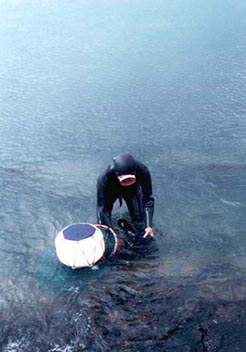
Diving into the sea bare-bodied to dig up the yield of the sea is a profession that can be found in only a few Asian countries, and in Jeju, it has traditionally been a woman's job, thus the term Haenyeo, meaning women divers.
Going from land to sea and back again every day of the year, Haenyeos have been the breadwinners of their family and major contributors to the economy, their income once accounting for 50% of the total Jeju economy. The songs sung by Haenyeos take up half the folk songs in Jeju, showing their value in terms of folklore. Also, the unusually strong bonding between Haenyeos form a democratic culture peculiar to women, setting them apart from the traditional marine culture of Western fishermen.
What is most surprising, however, is the fact that this group of special people, for all their anthropologic, cultural and social significance, has not been properly evaluated or researched.
From days of old, Haenyeos were held in contempt, branded as 'women who took their clothes off to earn money." They were thoroughly exploited during Japanese colonial rule, and then sent out to other islands after liberation, only to have their earnings snatched by middlemen. The society of Haenyeos has contributed significantly to society, donating their earnings to build schools and so on. But putting them in the same category as fishers has given rise to worries that it may lower the overall status of women.
Today, there are only about 5,000 Haenyeos in Jeju, and most of them are in their 50s, meaning that there is a high possibility that a few decades from now, Haenyeos will be extinct. Most of them suffer from severe after-effects of being submerged in water for so long, but the government refuses to acknowledge this as an industrial hazard.
Citizens also have a generally shallow understanding of Haenyeos, watching in amusement as these women who work with their lives on the line are asked to pitch their skills against diving champions just to see who can stay put the longest in the water.
Can we allow the Haenyeos of Jeju to fade into the back streets of history? Recently, 11 scholars from the Island Culture department of Jeju University took on a project to define the value of Haenyeos in terms of marine civilization. Even if we will never see real live Haenyeos in Jeju again, we must discover and keep alive the culture and spirit of the Haenyeos who resisted the Japanese colonialists with their bare bodies in the 1930s.

